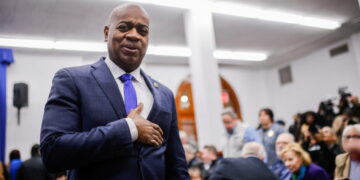Timothy Pearson, seen here behind Mayor Eric Adams, heads a covert mayoral unit closely linked to the NYPD, dedicated to overseeing service delivery across city agencies. | Arturo Holmes/Getty Images
July 4, 2024 Story by: Editor
NEW YORK — Over four weeks have passed since Mayor Eric Adams and his aides ousted their corporation counsel, leaving City Hall without a permanent top lawyer. As the deadline approaches for Adams to propose his preferred replacement to a wary City Council, new details have surfaced about the growing tensions that led to the resignation of Sylvia Hinds-Radix.
Hinds-Radix, a politically connected judge from Adams’ home borough of Brooklyn, stepped into the high-profile, $253,000-a-year role two and a half years ago. Her tenure ended amid disagreements with the mayor’s office, including her reluctance to defend a top Adams aide facing sexual harassment lawsuits and disputes over asylum-seeker litigation.
Timothy Pearson, a former NYPD inspector with a substantial salary and vague job duties, was accused of sexual harassment in March. Court documents detail how he allegedly made unwanted advances toward a subordinate, touched her inappropriately, and retaliated against her when she resisted.
Pearson heads a secretive mayoral unit linked to the NYPD, focusing on monitoring service delivery across city agencies. The incidents allegedly occurred in a building adjacent to City Hall housing the Mayor’s Office of Municipal Services Assessment.
After the lawsuit, the mayor’s office defended Pearson and suggested the Law Department represent him, potentially sparing Pearson from hefty legal fees if he couldn’t get union representation. Hinds-Radix resisted this move, according to three insiders granted anonymity to discuss internal dynamics.
When city officials face civil lawsuits related to their job, state laws entitle them to representation from the Law Department. However, if municipal lawyers find evidence suggesting an employee violated workplace rules, the city is prohibited from representing that employee. In Pearson’s case, Hinds-Radix lost her bid not to represent him. The city hired the law firm Wilson Elser to represent both the administration and Pearson due to an unrelated conflict of interest with the plaintiff.
John Scola, representing Pearson’s accuser, said Wilson Elser first contacted him on April 15, implying the decision to hire lawyers for Pearson followed the initial accusation against the Adams confidante. Since then, two related suits have been filed.
Hinds-Radix did not return requests for comment but addressed the lawsuit at a March press briefing, noting the need for the city to conduct “representation interviews” to determine its course of action. City Hall spokesperson Liz Garcia claimed proper procedures were followed and disputed any disagreement over the final decision.
This incident highlighted ongoing friction between Hinds-Radix and the mayor’s office, which began shortly after Adams took office. In spring 2022, a surge of migrants from the southern border overwhelmed New York City’s shelter system, creating legal challenges. City Hall’s inner circle wanted swift decision-making to address these issues, but Hinds-Radix was unwilling to compromise on established rules, insiders said.
Hinds-Radix, known as “the judge” within City Hall, was seen as a straightforward operator. However, the mayor’s team viewed her as too isolated within the expansive Law Department.
While Hinds-Radix formally resigned at the end of June, the drama continues. The appointment of her replacement, former Giuliani deputy mayor Randy Mastro, has stalled amid pushback within the City Council. The Law Department is now led on an interim basis by Hinds-Radix’s former deputy, potentially hindering the government’s legal operations.
John Kaehny of the government reform group Reinvent Albany noted that an interim leader can be manageable for a few weeks but detrimental over months. Without a permanent leader, the agency’s effectiveness diminishes as critical decisions become harder to enforce.
City rules allow Adams until the end of July to nominate a replacement, giving lawmakers another 30 days to vote under a 2019 law granting them veto power over the mayor’s pick. With budget negotiations concluded, the mayor’s push to appoint Mastro is set to resume.
The messy departure of Hinds-Radix is unusual for the typically stable Law Department. Since a 1989 charter-mandated overhaul of city government, every corporation counsel appointed at the start of an administration has served at least a full term, with one exception.
City officials signaled their dissatisfaction with Hinds-Radix six months ago, insiders said. In April, an article in The New York Times detailed City Hall’s efforts to recruit Mastro. The mayor’s team bypassed Hinds-Radix altogether, retaining Alex Spiro, a private attorney, to defend Adams against a separate sexual harassment allegation from his Transit Police days. The decision sparked discontent within the Law Department, typically responsible for defending city employees.
Adams defended the decision in an April briefing, indicating Hinds-Radix made the call to hire Spiro. Hinds-Radix frequently clashed with Brendan McGuire, the mayor’s former chief counsel, reflecting their different roles and approaches.
The corporation counsel must balance decisions for various city constituencies, while the chief counsel focuses solely on City Hall. Recent reforms have further distanced the mayor’s office from the city’s chief lawyer role.
As Hinds-Radix left, Adams praised her contributions. “Sylvia Hinds-Radix played a critical role in furthering this administration’s vision to protect public safety, rebuild our economy, and make our city more livable,” he said in a statement.
Hinds-Radix has remained largely silent about her departure and future plans, aside from a letter to Law Department colleagues. In a commencement speech at New York Law School in May, she shared candid advice on legal ethics, emphasizing honesty and integrity in advocacy. Source: Politico

















